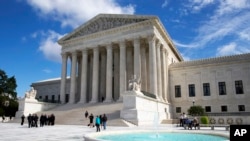The U.S. Supreme Court heard oral arguments Tuesday in a voting rights case that could change the way states draw boundaries for their legislative districts.
The nine justices are considering the case of two Texas voters who challenged the way the state draws its Senate districts.
Evenwel v. Abbott asks the court to examine whether the principle of one person, one vote requires state legislative districts to be apportioned on the basis of the state’s total population as they are now or based on the number of citizen voters.
The difference is big because there are a large number of people in the population who are not eligible to vote. Children, illegal immigrants and convicted felons are mostly concentrated in urban areas. Rural areas have higher concentrations of people who are eligible to vote, and they tend to lean Republican.
Thus, the court's ruling, expected in June, could shift voting power from urban areas to rural ones.
The plaintiffs, Sue Evenwel and Edward Pfenninger, are backed by a small conservative group, the Project on Fair Representation. They claim the state Senate redistricting map signed into law in 2013 did not equally distribute voters, improperly inflating the voting power of urban areas and giving them more sway in dictating the outcome of elections.
The one person, one vote doctrine dates to the 1960s, when the Supreme Court held that state legislative districts must be drawn so they are equal in population. The Supreme Court has long upheld the constitutionality of the practice, maintaining that all citizens have an equal interest in representative democracy, and the concept of equal protection therefore requires that their votes be given equal weight.
"It's called one person, one vote," Chief Justice John Roberts said of the constitutional principle at stake in the case. "That seems designed to protect voters."
"There is a voting interest, but there's also a representational interest," Justice Sonia Sotomayor countered, referring to the makeup of elected legislatures, which would most likely change if the rule was altered.
Civil rights groups say certain groups would lose all political influence. "Minorities, undocumented persons, minors and the incarcerated would become invisible and voiceless in the eyes of their state governments," said Jon Greenbaum, chief counsel for the Lawyers’ Committee for Civil Rights Under Law.
"Changing the one person, one vote standard would cause massive disruptions in the state’s election systems, especially before an election year. Urban areas with large young minority populations would lose; less populous, more affluent rural districts would benefit," Greenbaum added.
Conservative groups maintain the current system distorts the rights of nonvoters in the democratic process, particularly in states such as California, Texas and Florida, where larger numbers of noncitizen immigrants live and are counted in the census figures.
Texas picked up four congressional seats after the 2010 census, mainly because of the growth in its Hispanic population. If the challengers prevail, many of those new Texans will not be counted in drawing legislative district lines because they are too young to vote, not citizens or otherwise prohibited from voting.
In 2013, the high court struck down one of the key provisions of the 1965 Voting Rights Act, Section Five. It mandated that nine states, mostly in the South, with a history of voting discrimination, seek approval from the U.S. Justice Department before making changes to their election laws.
Observers say the Supreme Court could issue a ruling in Evenwel v. Abbott by early 2016.




